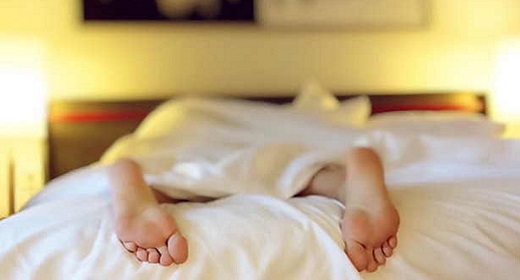Sleep is very important. This is why we spend about a third of our lives sleeping…
The many benefits of sleep help keep you healthy, lets you live long and allows you to avoid getting sick. To help you make sure you get enough of it, here’s how to sleep better each and every night.
The problem with sleep is it’s easy to take it for granted. When you miss out on sleep, it’s always easy to say I’ll make it up tomorrow or in the weekend.
However, because of all the hectic things that happen in life, you may end up not doing so. As a result, you end up sleep deprived. Project deadlines, anxiety or having to leave early in the morning all shorten the amount of sleep you have. Then there are times when you just lay in bed and can’t sleep.
If any of these things make it hard to fall asleep, we’ve put together some useful tips that will help you fall asleep faster and sleep longer through the night.
Lifestyle Tips to Improve Sleep
1. Exercise
When you are trying to get a better night of sleep, exercising can help improve mood, quality of sleep, and boost your overall well-being. This is especially true if you are an adult living with a sleep disorder like insomnia.
To accurately observe the relationship between exercise and sleeping habits researchers assessed total sleep time, sleep efficiency and sleep onset latency in a group of individuals while they followed a sixteen-week exercise program (1).
The results showed that exercising regularly helps to improve sleep efficiency, total sleep time, and sleep quality especially in individuals who reported previous sleep issues.
2. Limit Caffeine a Few Hours Before Bedtime
Minimizing caffeine intake is vital to getting a good night of rest. It’s also important to know that even if you drink caffeine long before you head to bed, it is still a detriment to your sleep, even when you don’t think it is.
This is according to a study which followed individuals who drank a caffeinated beverage right before bed, three hours prior to sleep, and six hours prior to sleep (2).
What the researchers found was that individuals who drank caffeine before sleep showed significant sleep disturbances even when the beverage was consumed hours before bed.
So, switching your afternoon coffee to decaf can let you get a better night’s rest. This way you wake up refreshed and able to do everything you need to be it home chores, taking care of the kids or excelling at work.
3. Avoid Alcohol
If a glass of wine has been helping lull you to sleep at night, you need to find a healthier way to fall asleep. That’s because studies have shown that any alcohol consumption disrupts your sleeping patterns during the second half of the night (3).
In addition, the onset of REM sleep is also delayed when you consume alcohol near bedtime. And, as dose increases, the delay of REM can also increase.
So, while chardonnay helps you fall asleep faster, it can leave you feeling less rested than you’d feel being up the extra hour anyway.
4. Limit Water Before Bedtime
It is always important to drink an adequate amount of water to avoid dehydration. Doing so helps your body function at its prime.
But, what you probably didn’t know is that there is a right and wrong time to get your fluids in.
While you should drink about eight glasses (or more) of water per day, drinking water too close to bed will disrupt your sleep (4).
Since your urine output naturally decreases at night, drinking large volumes of water near bedtime will have you waking up more often at night to run to the bathroom (4).
5. Meal Timing and Portion Size
Eating before bed is a doubled edged sword. And, if you don’t eat at the perfect time, you may run into issues with sleep disruptions (5).
Additionally, when you eat a hefty meal too close to when you lay down, your body can struggle to digest your food. Thus, keeping you awake at night with heartburn.
On the other hand, if you eat too far before bed time, hunger will keep you up or wake you up for that midnight craving.
As such, should you wake up hungry in the middle of the night, eating a healthy, light snack can satisfy you enough to help you go back to bed and get some rest.
6. No Smoking
As if you needed another reason to stop smoking.
Even the occasional cigarette can cause significant sleep disruptions, especially when compared to a non-smoker (6).
Smokers who participated in a study reported more issues with staying awake, going to sleep, and daytime lethargy than the nonsmokers. The discovery that cigarettes negatively impacted sleep has allowed doctors to treat patients with poor sleeping habits from an entirely different angle.
And, if you still light up, quitting would help you get the rest you deserve.
7. Sleeping Pills
There are a variety of sleeping pills that can help you fall asleep and stay asleep with minimal risks if properly regulated by your primary care physician (7).
But, it is important that you and your doctor try other means of improving your sleep habits before switching to a sleeping pill. That said, once you find the right pill you can get into the restorative phase of sleep easier and stay asleep for longer.
As we mentioned before, diet, exercise and lifestyle are important to your sleep. But, if you have a sleep disorder or have tried everything, a sleeping pill may be right for you.
Bedroom and Sleeping Environment Hacks to Help You Sleep Better
8. Sharing a Bed vs. Sleeping Alone
Lifestyle changes aren’t the only ways to get better sleep at night, research has shown that individuals who sleep next to their partner get higher quality sleep when compared to those who sleep alone (8).
However, if you and your partner are going to bed angry or have has a tense relationship you won’t experience sleep benefits because the increase in sleep quality stems from anxiety reduction.
This anxiety reduction occurs because of better partner responsiveness, emotional support, and agreeableness, which triggers the release of oxytocin, a hormone that combats stress and will help you sleep better (8).
On the other hand, individuals who sleep alone we do not see the anxiety reduction benefit because there is no oxytocin release to drive it.
9. Your Bedroom’s Color
Painting your bedroom in more muted and darker colors can create a better sleeping environment that allows you to fall asleep sooner and get slightly better sleeping quality all together (9).
Some studies have shown that those who slept in darker colored bedrooms reported themselves having more emotional serenity, being at peace, and more content while falling asleep than the individuals who slept in more vibrantly colored rooms.
On the other hand, some cases have shown that certain colors decrease melatonin production. But, more follow up research is needed to confirm this.
10. Lighting
If you are one of the many people who fall asleep to the TV at night, chances are that you aren’t getting close to the quality sleep you should be (10).
Exposure to light coming from your TV, even during sleep, stimulates your brain to decrease levels of melatonin that helps you fall asleep and stay asleep.
So, to get your best sleep, you should stop using your phone, computer, and television at least thirty minutes before you lay down for a restful slumber.
Some sleep studies have indicated that making your bedroom completely technology free will improve your ability to fall asleep, stay asleep, and wake more rested (10).
11. Temperature
Whether you sleep best under a bunch of blankets or wake up to your blanket on the floor, there is an ambient temperature that can help you get the best sleep at night (11).
When you drift off to sleep, your brain lowers body temperature slightly which will help you stay asleep. But, if you are in a room that’s too hot or too cold, your brain will have a harder time adjusting the temperature. When this happens, it delays and interrupts restful sleep.
While everybody has their own temperature preference, research shows that the sweet spot for sleep is staying within the 65 to 72-degree range. Within these levels, your brain is able to thermoregulate the body best. Thus, improving sleep greatly (11).
12. Noise Level
You may believe that sleeping without any noise can give you the best quality of sleep. But, research has shown that sleeping in a noiseless room may be actually be causing you more harm than good (12).
Deep sleep is the restorative portion of nightly sleep. And, ambient pink noise associated with the sound of flowing water or other similar sounds has shown to increase deep sleep and improve memory (12).
This happens because your brain waves can synchronize with the ambient sound to help you rest better. And, when compared to those who did not listen to music, the individuals who listened to pink noise performed up to three times better on memory tests.
Rest and Relaxation Tips for Better Sleep
13. Does Meditation Help You Sleep Better?
Lifestyle and behavioral changes can help you make improvements to your sleep, but incorporating meditation helps you relax and drift off to a deep sleep sooner (13).
When research compared individuals who attended a sleep education course against those who incorporated meditation techniques, the group who incorporated meditation into their lives reported less insomnia, depression, and overall fatigue compared to those who attended a sleep education course (13).
This occurs because the focus on breathing meditation evokes a relaxation response that combats stress hormones, pain, and quiets the mind allowing you to sleep better (13).
14. Taking Time to Wind Down Before Going to Bed
Not only can meditation and powering down the digital devices before sleep help you rest, but just chilling in bed doing absolutely nothing will help you sleep better at night too (14).
When you get into bed and your mind is racing about what you must do tomorrow, focus on not thinking at all. This will make it easier to fall asleep.
If you aren’t the type of person who likes to do nothing, try meditation. It works just as well because it allows your mind to relax.
Similarly, if you’re in bed trying to sleep and aren’t able to, try not to focus on the situation. That’s because it will cause you to hold more tension in your body. When this happens, it further delays sleep.
So, setting aside an hour before bedtime to not worry or think about anything, be it work, emails, or your plans for tomorrow. Doing so is important to help you unwind before bed (14).
This additional hour of doing nothing lets your body relax before you fall asleep. In doing so, you’ll be able to fall asleep faster and sleep better.
15. Aromatherapy
Research shows that diffusing lavender oil when you are unwinding and getting ready for bed helps you fall asleep faster. And, it makes you feel more alert upon waking the next day than you normally would (15).
While the exact mechanism is unknown, lavender oil helps you relax and fall asleep sooner than not smelling anything at all. This is thanks to its soothing properties.
In fact, even in individuals with mild sleep disorders, lavender oil aromatherapy greatly improved the quality of sleep people were getting (15).
That’s because there has always been a link between the olfactory system and sleep. But, we are continuously learning more about aromatherapy’s benefits.
Sleep Hygiene and Before Bed Rituals to Fall Asleep Faster
16. Turning Off or Staying Away from Digital Screens
It is important to make your bedroom technology free because the blue light these devices produce drastically stunts your melatonin production (16).
This means you should stop looking at your phone, computer, and TV at least an hour before bed. This way melatonin production isn’t impacted to where it shifts your sleeping cycle.
By decreasing screen time before sleeping, you will have three times the amount of sleep inducing neurotransmitters produced compared to an individual who has been looking at a screen all night (16).
As such, leaving technology out of your bed allows your brain to relax and helps you get to sleep sooner.
17. Listening to Music
You can improve the quality of sleep you get by listening to soft, classical music while you lay in bed and wait for sleep (17). Individuals who listened to classical music experienced better sleep quality than individuals who fell asleep with no music or ambient noise (17). The classical music listeners also had better sleep then those who fell asleep to an audiobook (17). To better relax before bed and drift off to sleep sooner play some quiet classical music, it will even enhance memory dependent tasks the next day (17).
18. Taking a Hot Shower Before Going to Sleep
We discussed earlier that your brain decreases body temperature to help you fall asleep. But, taking a hot shower prior to bed can be beneficial if timed properly (18).
You don’t want to take a hot shower too close to bedtime or else your body temperature will not drop enough to prime it for bedtime. When this happens, you’ll find it harder to fall asleep.
However, if you take a hot shower and hour and a half before bedtime, it will soothe your tired muscles and help you relax after a long day. And, the hour and a half allowance will give your body time to cool down letting you sleep easier.
19. Reserving the Bed for Sleep and Sex Only
Your brain associates locations with the tasks you frequently carry out within that area. So, reserving your bedroom for sex and sleep only helps improve the quality of sleep you get (19).
On the other hand, if you do stimulating tasks like eating or working when in bed, your brain will start to associate being in bed with trying to stay awake. This stimulation decreases melatonin production. The decrease in melatonin will make it harder for you to fall asleep when your bedtime comes.
So, stick to sleeping and sex in bed to ensure your brain knows that time spent in bed is time to power down for the night (19).
20. Sleeping and Waking Up At the Same Time Daily
Instituting a regular sleep schedule where you wake up and go to bed at the same time every day will improve the quality of the sleep you get (20).
When you go to sleep at irregular times, it shifts your circadian rhythm making it harder to go to bed at the time you want. By waking up at the same time every day, your brain will get into the habit of producing melatonin at the right time to maintain a sleep schedule.
This makes it easier to fall asleep and wake up daily.
















































